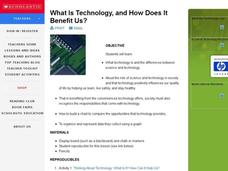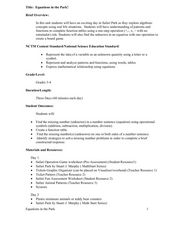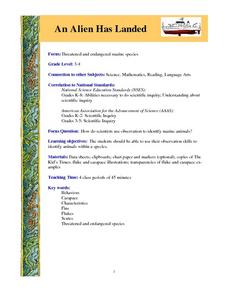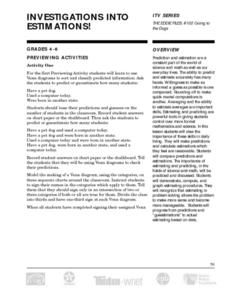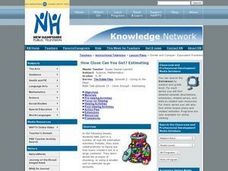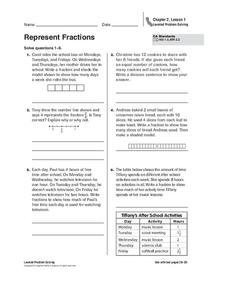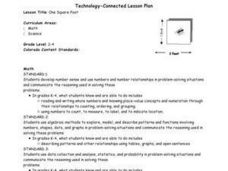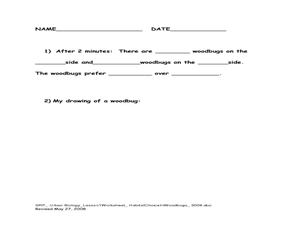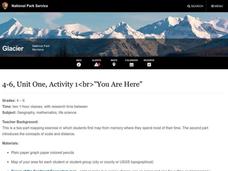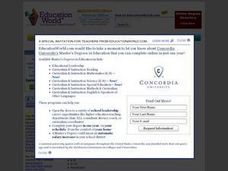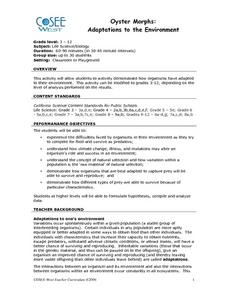Curated OER
What Is Technology, and How Does It Benefit Us?
Students examine and define what technology is as well as the differences between science and technology. They assess the role of science and technology in society, conveniences technology offers and create a chart to compare the...
Curated OER
Equations in the Park
Young scholars explore algebraic concepts using real life situations. In this equations lesson, students develop strategies to solve missing number problems. Young scholars participate in a board game based on algebraic equations.
Curated OER
Circumference Review
In this circumference lesson plan, learners review how to find the diameter and circumference of a circle, they apply their skills to a real life application. Students are presented with the task of determining the circumference of trees...
Curated OER
An Alien Has Landed
Students identify animals within a species by using their observation skills to record information, such as behavioral characteristics.
Curated OER
Investigations into Estimations
Students gain the powerful tools of estimation, prediction, and averaging and discover the importance these tools have in daily living.
Curated OER
How Close Can You Get? Estimating
Students work collaboratively to determine how many crackers are in a large container. They then view a video to see how often people use estimation in their jobs, and another video to watch students work on figuring out appropriate...
Curated OER
Methods of Mystery
Students utilize the scientific method to discover the age of an item. In this historical dating lesson plan, students compare and contrast a 400 year old cabinet to one made within a few years by using carbon dating....
Curated OER
Round The Track
Fourth graders develop problem solving skills while learning to measure an athletic track. The focus upon logic and reasoning is helpful for all types of science and math calculations.
Curated OER
Represent Fractions
Using word problems can be a good way to help students practice working with fractions. In this worksheet on fractions, students solve problems involving real-life examples. This worksheet is part of the Houghton Mifflin math series and...
Curated OER
One Square Foot
Students identify, describe, count, tally, and graph life found in one square foot of land.
Curated OER
How Electronics Come to Us: Distribution and Use
Students identify environmental challenges that can be solved throughout a product's life cycle. They experiment and examine how we can choose and use products in an environmentally responsible manner. Each student is also involved in...
Curated OER
Deer Tracks
Students use satellite images to track to movement patterns of deer and examine deer behavior. They write stories about a day in the life of a field scientist.
Curated OER
What is Air?
Students investigate air by participating in a class experiment. For this matter measurement lesson, students identify air as a gas which consists of mass. Students utilize a windsock or balloon to measure oxygen and explore it's true...
Curated OER
Habitat Choice in Woodbugs
Students investigate woodbugs. In this scientific investigation lesson, students explore the steps scientists take when conducting an investigation using live specimens. Students explore habitat preferences for woodbugs in various...
Curated OER
You Are Here
Students map local places and learn to use scale and distance. In this mapping lesson, students map their school and a favorite place. Students recreate their maps showing distance and scale sizes. Students locate their...
Curated OER
Grid Frame Mapping
Students map and describe small area of the schoolyard and discuss habitats.
Curated OER
Marmots: Groundhogs of the World
Students research 14 groundhog species found around the world, including the woodchuck. They use the internet to research groundhogs and students organize their information using a graphic organizer.
Curated OER
Track Traces
Learners explore animal characteristics by participating in an animal anatomy activity. In this animal tracks lesson, students identify the differences between specific animals and the shape of their footprints. Learners utilize a...
Curated OER
Don’t Sit Under the Apple Tree…You Might Become Famous
Students explore Newton's laws using CEENBoTs. In this physics lesson, students collect data and create tables and graphs. They calculate speed, acceleration and forces using mathematical formulas.
Curated OER
Honing in on Hummingbirds
Students explore ruby-throated hummingbirds. In this cross-curricular hummingbirds lesson, students listen to the book The Mystery of the Missing Hummingbirds and choose related topics to research with a partner. Students draw or...
Curated OER
Oyster Morphs: Adaptations to the Environment
Students demonstrate how organisms adapt to their environment. They examine prey and predators, natural selection, and adaptations by representing oyster morph.
Curated OER
Shapes (Orienteering)
Students explore the tools of navigation. In this shapes instructional activity, students navigate using direction cues to create a shape. Students follow specific steps to create their shapes. Students use compasses to see...
Curated OER
A Shadow of Yourself
Students measure the length of their shadows three times during the day, Students determine the differences in shadow lengths after each measurement. They discuss why the length changed from one time of day to another.
Curated OER
Fish Communities in the Hudson
Learning to read data tables is an important skill. Use this resource for your third, fourth, or fifth graders. Learners will will study tables of fish collection data to draw conclusions. The data is based on fish environments in the...
Other popular searches
- 4th Grade Life Science
- Life Science Inquiry
- Life Science Vertebrates
- Life Science Experiments
- K 2 Life Science
- Life Science on Cells
- Life Science Lesson Plans
- Grade 4 Life Science
- Life Science Report Topic
- Australia Life Science
- The Life Science
- Life Science Lessons
